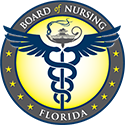Click on the appropriate tabs to see the Initial Licensing Requirements, Process, Fees, Statutes and Administrative Rules for Practical and Professional Nursing Education Programs.
For a professional nursing education program, the program director and at least 50 percent of the program’s faculty members are registered nurses who have a master’s or higher degree in nursing or a bachelor’s degree in nursing and a master’s or higher degree in a field related to nursing.
For a practical nursing education program, the program director and at least 50 percent of the program’s faculty members are registered nurses who have a bachelor’s or higher degree in nursing.
The educational degree requirements of this paragraph may be documented by an official transcript or by a written statement from the educational institution verifying that the institution conferred the degree.
The program’s nursing major curriculum consists of at least:
- Fifty percent clinical training for a practical nursing education program, an associate degree professional nursing education program, or a professional diploma nursing education program.
- Forty percent clinical training for a bachelor’s degree professional nursing education program.
- a. No more than 50 percent of the program’s clinical training consists of clinical simulation.
- b. The program has signed agreements with each agency, facility, and organization included in the curriculum plan as clinical training sites and community-based clinical experience sites.
- c. The program has written policies for faculty which include provisions for direct or indirect supervision by program faculty or clinical preceptors for students in clinical training consistent with the following standards:
- The number of program faculty members equals at least one faculty member directly supervising every 12 students unless the written agreement between the program and the agency, facility, or organization providing clinical training sites allows more students, not to exceed 18 students, to be directly supervised by one program faculty member.
- For a hospital setting, indirect supervision may occur only if there is direct supervision by an assigned clinical preceptor, a supervising program faculty member is available by telephone, and such arrangement is approved by the clinical facility.
- For community-based clinical experiences that involve student participation in invasive or complex nursing activities, students must be directly supervised by a program faculty member or clinical preceptor and such arrangement must be approved by the community-based clinical facility.
- For community-based clinical experiences not subject to sub-paragraph 3, indirect supervision may occur only when a supervising program faculty member is available to the student by telephone.
A program’s policies established under this paragraph must require a clinical preceptor, if supervising students in a professional nursing education program, to be a registered nurse or, if supervising students in a practical nursing education program, to be a registered nurse or licensed practical nurse.
- The professional or practical nursing curriculum plan documents clinical experience and theoretical instruction in medical, surgical, obstetric, pediatric, and geriatric nursing. A professional nursing curriculum plan shall also document clinical experience and theoretical instruction in psychiatric nursing. Each curriculum plan must document clinical training experience in appropriate settings that include, but are not limited to, acute care, long-term care, and community settings.
- The professional or practical nursing education program provides theoretical instruction and clinical application in personal, family, and community health concepts; nutrition; human growth and development throughout the life span; body structure and function; interpersonal relationship skills; mental health concepts; pharmacology and administration of medications; and legal aspects of practice. A professional nursing education program shall also provide theoretical instruction and clinical application in interpersonal relationships and leadership skills; professional role and function; and health teaching and counseling skills.
Each curriculum plan must document clinical training experience in appropriate settings that include, but are not limited to: acute care, long-term care and community settings. The program must also have obtained signed agreements with each agency, facility and organization included in the curriculum plan as clinical training sites and community-based clinical experience sites.
- An educational institution submits an application with the associated fee.
- The Education Unit shall review the application to determine whether it is complete. If a program application is not complete, the educational institution will be notified in writing of any errors or omissions within 30 days after the department’s receipt of the application.
- The board shall deny a program application for a new pre-licensure nursing education program submitted by an educational institution if the institution has an existing program that is already on probationary status.
- Upon completion of your application, the Board must make a decision within 90 days.
- An NCLEX code assignment is requested from the National Council of State Boards of Nursing (NCSBN).
- Upon receipt of the NCLEX code assignment, the program is approved. The new nursing education program’s approved status will be reflected on the pre-licensure nursing education comparative website within 24 hours.
- An approval letter is sent to the nursing program director.
$1000.00 Application Fee
Click on Chapter or Section Number to View
Florida Statutes
Section 464.019: Approval of Nursing Education Programs






